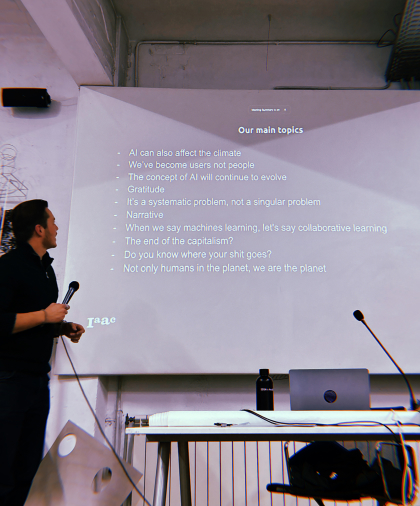Designing in a State of Climate Emergency¶
Reflection¶
This course has been a significant advancement for me, both personally and professionally. In this master’s seminar, which essentially focuses on designing in a state of climate emergency, we’ve delved into discussions about growth, human nature, time and various aspects of our own identity. Essentially, this seminar has allowed me to understand my position in this world, who I am, and what I can contribute as an entity and individual with the cultural, ecological and societal transformations shaping this decade. It has also enabled me to connect with the world and humanity at large, observing how we, as a collective, can connect with our planet.
I believe this seminar has helped me personally to comprehend my relationship with my surroundings. At times, I find myself getting too absorbed in who I am, and ultimately, I recognize that I am just one entity and an event within the broader context of Earth and humanity. On the design front, I’ve appreciated realizing that as designers, we are agents of change. However, it’s crucial to acknowledge that society is undergoing a policrisis, and any changes we seek to make will likely be part of a global shift connected to the ongoing societal crisis.
What resonates with me is the need to question things and break away from linear, capitalist thinking. It’s about designing while connecting with our surroundings, the world, the Earth, and the sun—attempting to stop the acceleration driven by capitalism and instead fostering connections with our environment. In essence, we are inevitably becoming transhuman, and humanity is evolving. We must draw inspiration from the past and the efforts of our ancestors to reach this point. From this seminar, I’ve learned the importance of embracing the past with gratitude and drawing inspiration from it to shape the future.
The fact that we are becoming users rather than individuals and the idea that it’s easier to envision the end of the world than the end of capitalism are significant takeaways for me. Considering that my master’s theme involves studying humanity and human identity as technology becomes integrated into our bodies, I’m inspired to explore futures that go beyond mere technological integration and understanding the socio-economic, socio-technical, and eco-sociological aspects of it. I want to examine the entirety of the future and society when proposing these exercises and learn from the past experiences of humanity to guide us in the future.
From this seminar, I take away the importance of seeing the bigger picture. The problem I want to solve is part of a broader global issue, so I shouldn’t feel overwhelmed. I’ll approach it with patience, learning from the past to shape the future. Recognizing we’re part of the planet and not separate entities is crucial. I’ll connect more with nature, understanding the earth influences us. Designing for the future involves connecting with the earth and finding ways to coexist with it.
Field Trip¶
 On the last day of class, we decided to engage with the people of Barcelona in an activity aimed at helping them discuss climate change patiently and pleasantly, making them aware of the urgent climate issues our planet is facing.Our specific group noticed that most classmates were trying to prompt reflection by creating banners directly related to the climate emergency, aiming to make people realize there’s a problem with society. In contrast, we took a more inspirational route, aiming to make them feel optimistic. We approached them first, initiating conversations about the future they envision, emphasizing that certain changes are needed. When we hit the streets and talked to people, most were already environmentally conscious, expressing a desire for a greener, more sustainable future.
On the last day of class, we decided to engage with the people of Barcelona in an activity aimed at helping them discuss climate change patiently and pleasantly, making them aware of the urgent climate issues our planet is facing.Our specific group noticed that most classmates were trying to prompt reflection by creating banners directly related to the climate emergency, aiming to make people realize there’s a problem with society. In contrast, we took a more inspirational route, aiming to make them feel optimistic. We approached them first, initiating conversations about the future they envision, emphasizing that certain changes are needed. When we hit the streets and talked to people, most were already environmentally conscious, expressing a desire for a greener, more sustainable future.
When asked about the changes required in society to achieve this vision, many focused on personal changes and changes within society. In conclusion, most people envisioned a greener future, desiring its realization. However, they believed their contribution was limited to increased recycling. They felt society, in general, needed to change its mindset, stop demanding unnecessary things, and move away from the mindset of constant need without contributing to society. The responses were few but precise, aligning with our seminar discussions that emphasized the need for a societal shift in thinking, operating, and mutual expectations to reach an emergent future where humanity thrives and emerges from the climate crisis.

